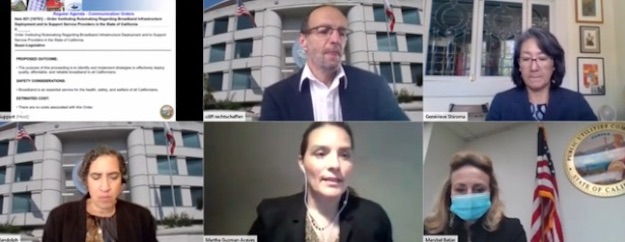
With the intent to “effectively deploy quality, affordable, and reliable broadband to all Californians”, the California Public Utilities Commission voted on Thursday to break the grip of telecommunications monopolies and change the way the industry is structured, incentivised and regulated.
It’s the CPUC’s response to governor Gavin Newsom’s executive order directing state agencies to fix California’s broadband deficit.
Commissioner Martha Guzman Aceves, who is leading the effort, explained the reasoning behind it in stark terms…
It’s not really focused on how we are improving our current failed system, but it’s really asking what the different ways and approaches we can take to systemically change our current system around providing the critical service of Internet.
We’ve been forced by our federal government to succumb to rules based on imaginary definitions of what the Internet is, which then block our ability to ensure universal service, and affordable service, through regulation. The justification has been made that competition will solve for it all, that the carriers will compete and bring down the prices and serve everyone. This neoliberalism economic theory has failed many Californians.
In fact, as you all know, 23% of Californian households do not have the Internet at home. That’s leaving 8.4 million Californians digitally disadvantaged and unable to participate in many of the benefits of economic and civic life.
And this has to change.
We all know this so intimately today as we take refuge in our homes, not only from covid but from the clouds of smoke and particulates that spread across our state. The Internet has been able to save many jobs, many people’s health, and our children’s education. And every Californian, every neighborhood needs the Internet to be resilient.
Before the Internet came to be, our strategy for serving all Californians’ telecommunications needs was to incentivise carriers based on a regulatory monopoly utility model. But…what we have left is really only an incentive-based set of strategies which have failed to meet the needs of universal service and affordability.
A major reason why this incentive-based approach through competition is not working is because there is no competition.
Only a very small group of Californians have choices. Less than 7% of Californians are served by three or more providers. About half of us have two choices. But over 40% have one or fewer. They may not have service at all.
Throughout the state, as an example of this 40% that have one or fewer service providers available to them, there’s not any area in the state where a cable company is competing with another cable company. If that cable company chooses not to serve all the residents in the community, there is no cable option. This is due, once again, to the perverse federal construct and the lack of obligation to serve all Californians…
So what does this result in? Everything that you know already. Tribes and rural communities left behind with poorly maintained infrastructure with insufficient speeds. Neighborhoods and urban communities that are redlined. And excessive pricing, due to this monopolised and oligopolised market that we have across the state…
So today I’m very excited…to ask the public to engage in this proceeding and offer their ideas for developing strategies for deploying more fiber in areas that lack it. Which can also provide for actual competition and, ultimately, affordability and universal access. This is a call for innovation, though pilots, through new partnerships and new strategies. We all know the urgency, and I’m very excited to get moving on these transformative solutions.
The other four commissioners stated their enthusiastic support, and then voted unanimously to launch the “Broadband for All” rulemaking.
This sort of proceeding typically drags on for years at the CPUC, but there’s reason to be optimistic that this time will be different. Newsom gave state agencies a December deadline for action. Under president Marybel Batjer – Newsom’s troubleshooter who was appointed last year – the CPUC has moved more quickly, particularly on high priority problems like covid–19, wildfires and utility bankruptcies.
